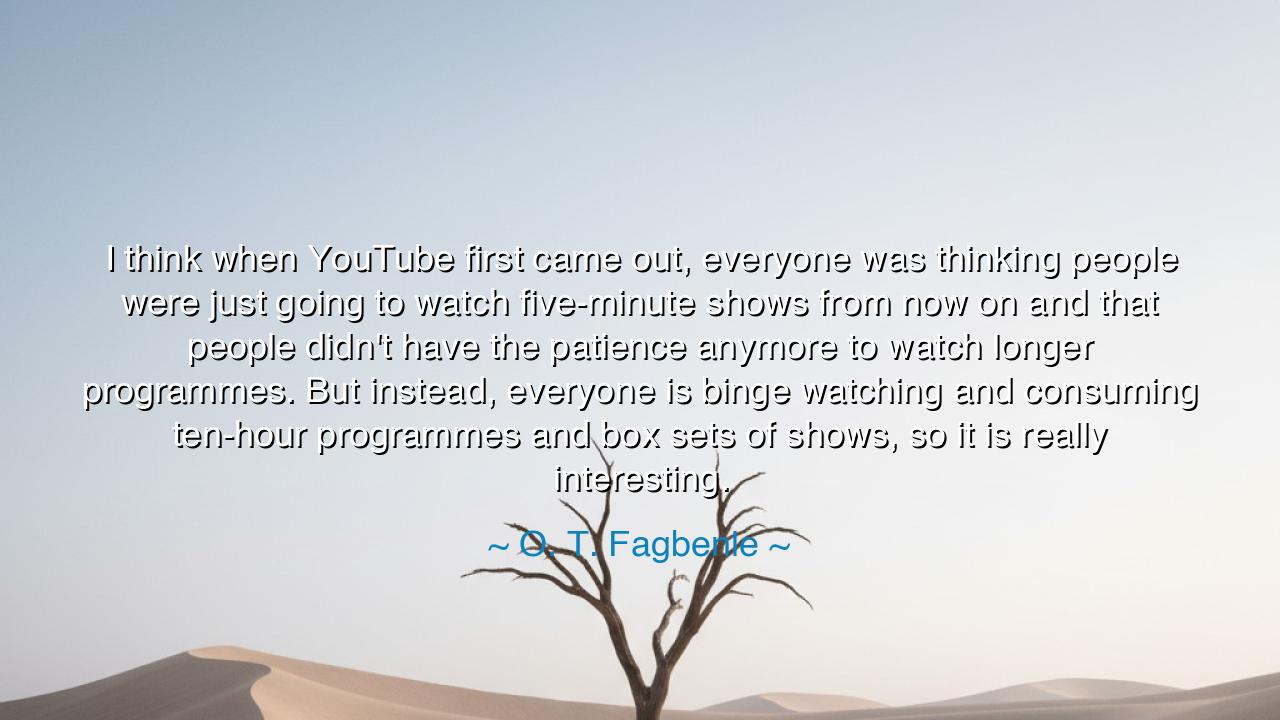
I think when YouTube first came out, everyone was thinking
I think when YouTube first came out, everyone was thinking people were just going to watch five-minute shows from now on and that people didn't have the patience anymore to watch longer programmes. But instead, everyone is binge watching and consuming ten-hour programmes and box sets of shows, so it is really interesting.






In the words of O. T. Fagbenle, we are shown a revelation about the ever-changing nature of human attention and storytelling. When YouTube first appeared, many believed that mankind’s ability to focus was crumbling, that only short clips and five-minute shows would survive in the new age of flashing lights and instant gratification. Yet, against these expectations, a profound truth emerged: the human soul still longs for narratives, for long journeys, for ten-hour sagas that unfold like ancient epics. What was thought to be an age of fleeting distraction has instead become an age of binge watching, a devotion to story that echoes the firesides of the ancients where listeners would sit for nights upon nights to hear a tale to its end.
This quote reveals a paradox. Though the tools of technology appear to hasten life, compressing it into smaller bursts of experience, man still seeks immersion. The box sets, the long-form shows, are not mere entertainment; they are a return to the old ways of serial storytelling, akin to the epics of Homer, the Mahabharata, or the sagas of the Norsemen, which could not be captured in mere moments but demanded time, patience, and surrender. What has changed is not the need for story, but the vessel. The scroll has become the screen, the bard has become the streaming service, yet the yearning remains eternal.
Consider the tale of Charles Dickens, whose novels in the 19th century were released in serialized form, chapter by chapter, keeping entire nations waiting for the next installment. Crowds gathered at the docks of New York, desperate for the ships that carried his latest words across the Atlantic. His readers did not tire after five minutes; they consumed hours upon hours, nights upon nights, of his rich worlds. Today, we see the same spirit reborn in the consumption of shows that span ten hours or more, proving that the human heart craves the continuity of story, not its brevity.
The deeper teaching here is that humanity misjudges itself when it assumes weakness in its attention span. The truth is subtler: man turns away not from length but from emptiness. If a story carries weight, if it breathes with characters that live and struggle, then people will walk alongside them for as long as the journey requires. This is why mere clips cannot replace epics, why the shallow cannot replace the profound. In the presence of meaning, patience awakens, and the mind endures.
O. T. Fagbenle’s words remind us also of the surprise of evolution—that the path of culture cannot be neatly predicted. Just as seers of the past once believed the printing press would destroy memory or that television would ruin the theatre, the arrival of YouTube was believed to herald the end of long-form tales. Yet instead, the long form has flourished anew, proving that the human spirit adapts, but never abandons its deepest hungers. It is the same lesson history teaches again and again: fear not the new, for it often revives what seemed lost.
Let us remember, too, that binge watching is more than indulgence; it is an act of devotion. When one gives oneself over to hours of narrative, one is affirming that patience, endurance, and immersion still have value. The danger lies not in the watching, but in the forgetting—forgetting to apply that same endurance to one’s own life, to one’s own work and relationships. For if we can give ten hours to a tale, can we not also give ten hours to our craft, to our learning, to the building of our destinies?
The lesson, then, is clear: do not assume the weakness of humanity, nor your own. Your attention is not broken, it only awaits something worthy. Seek out stories, tasks, and labors that deserve the fullness of your being, and when you find them, do not settle for five minutes of effort—immerse yourself, give hours, give days, give years. For greatness, like the grand narratives of old, is not tasted in fragments but lived in long, sweeping arcs.
Therefore, children of tomorrow, carry this wisdom: the world may shrink its moments into flashes, but your soul still hungers for the epic. Choose what is worthy of your time. Give yourself not to the fleeting, but to the enduring. For in the end, the true story of your life will not be a clip, but a long and noble journey.






AAdministratorAdministrator
Welcome, honored guests. Please leave a comment, we will respond soon